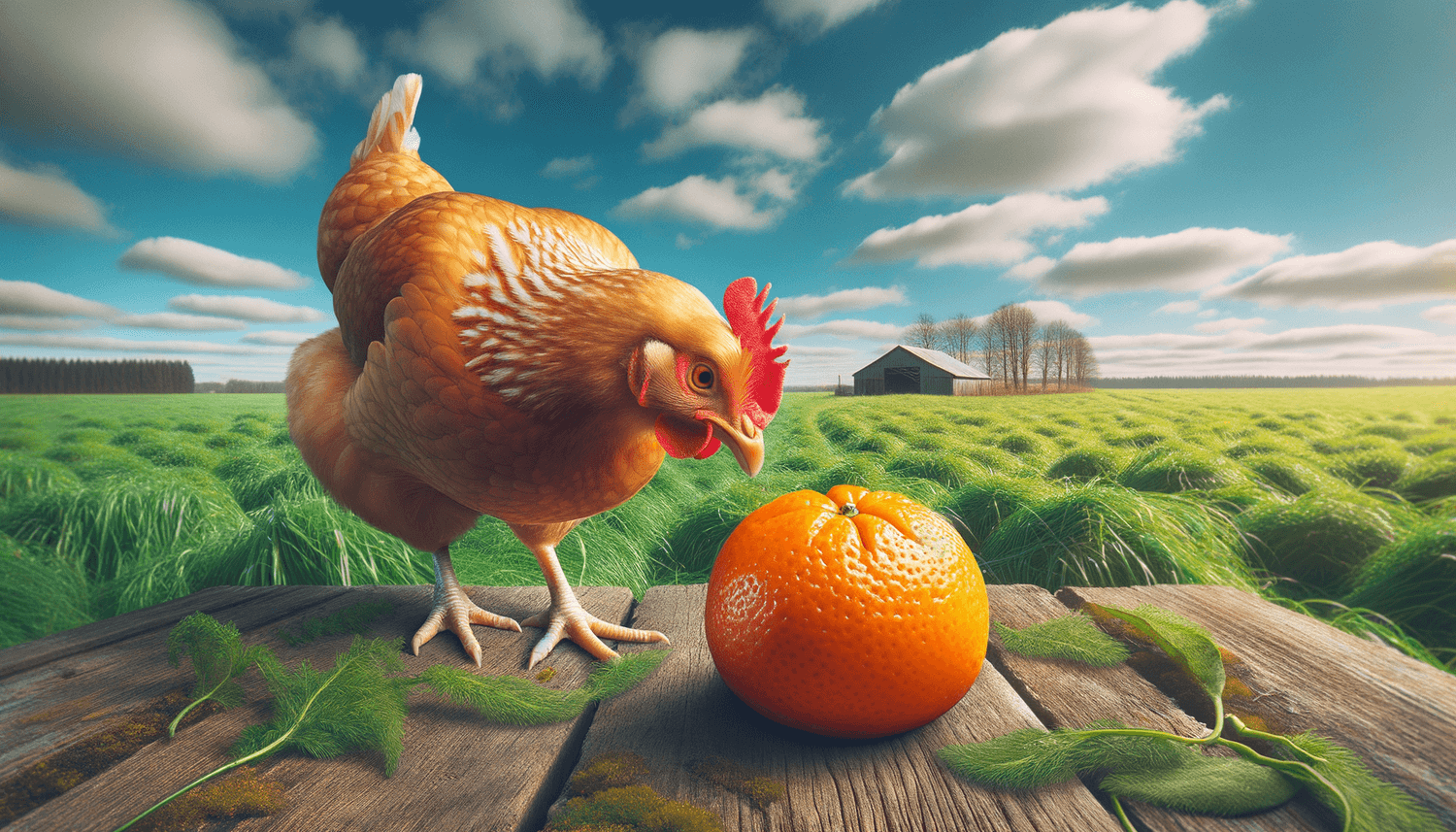🐓 Cluck, cluck! Here’s a juicy topic for all you backyard chicken enthusiasts out there! When it comes to tasty treats for your feathered friends, can chickens peck on tangerines? 🍊 We know that variety is the spice of life (and the secret to a balanced chicken diet), so let’s dive into the wonderful world of tangerines for chickens. In this egg-citing blog post, we will explore if our clucking companions can indeed indulge in this citrusy delight, discuss the importance of a well-rounded diet, reveal any benefits or risks, unwrap the nutritional value, and provide tips on how to prepare these tantalizing treats just for them. Let’s make some (tangerine) zest of it, shall we? 🍊
Can chickens eat tangerines?
Yes, chickens can eat tangerines, but in moderation. Tangerines are safe as an occasional treat, providing variety and some essential vitamins. However, it’s important not to overdo it, as too much citrus can cause digestive issues and an imbalanced diet in your flock.
A balanced diet for happy hens
Just like humans, chickens need a balanced diet to stay healthy and thrive. A well-rounded diet provides these feathered friends with essential nutrients, vitamins, and minerals to ensure that they lead a happy, egg-cellent life. So, how do we create a perfectly balanced diet for our clucking companions?
Enter: high-quality chicken feed. The cornerstone of any good backyard chicken’s diet is a nutritious, complete chicken feed, which should make up around 80-90% of their total intake. This crucial portion ensures that your hens are getting all the necessary nutrients tailored specifically to meet their needs.
Now, let’s talk treats! Fruits and vegetables can account for the remaining 10-20% of your flock’s diet. This is where tangerines and other healthy treats come into play. Not only do these tasty snacks offer extra vitamins, but they also help keep things interesting and varied for our feathered friends, making their day-to-day foraging all the more exciting!
Nutritional value of tangerines for chickens.
Tangerines offer several nutritional benefits for chickens, making them an appealing treat when fed in moderation. One of the primary advantages of tangerines is their high vitamin C content. This essential vitamin helps support healthy growth, immune function, and overall well-being in both humans and chickens alike.
Moreover, tangerines are also rich in other vitamins and minerals, such as vitamin A, B vitamins, potassium, and fiber. Vitamin A is crucial for maintaining good skin and eye health in chickens, while B vitamins have a range of roles in energy production, metabolism, and nervous system function. Potassium is vital for maintaining fluid balance and proper muscle function, and fiber keeps the digestive system working smoothly.
Another benefit of tangerines is their high water content, offering a hydration boost for your feathery friends. This is particularly valuable during hot summer days when chickens need extra help staying cool and hydrated. Overall, while tangerines may not be the most nutrient-dense treat out there, they can definitely provide a refreshing, vitamin-packed snack for your backyard chickens.
Nutrition table of tangerines for chickens.
| Information | Description |
|---|---|
| Nutritional Value | High in vitamins C and A, B vitamins, potassium, and fiber. |
| Suggested Serving Size | Small portions, making up no more than 10-20% of the chicken’s diet. |
| Safe Feeding Practices | Feed in moderation, avoiding overconsumption to maintain a balanced diet. |
| Preparation | Wash tangerines, remove seeds, and chop into small, manageable pieces. |
| Potential Risks | Overconsumption can cause digestive issues and imbalance in the chicken’s diet. |
| Hydration | Tangerines have a high water content, providing hydration for your chickens, especially during hot days. |
| Digestion | Fiber in tangerines supports a healthy digestive system. |
| Seasonal Availability | Tangerines are available from late fall through winter, making them a great seasonal treat. |
| Other Benefits | Vitamins and minerals in tangerines support immune function, growth, and overall well-being. |
Introducing tangerines to your chickens
When you’re ready to treat your backyard chickens to a taste of tangerines, it’s crucial to ease them into it gently. Start by offering small, manageable pieces to your flock and observe their reactions. Some chickens may quickly take a liking to tangerines, while others may not be as keen on this citrusy treat. Remember to keep portions small and balanced, as overfeeding can lead to health issues.
Additional treats and variety
Besides tangerines, there are plenty of other healthy treats you can consider for your chickens to add more variety to their diet. Favorites among backyard flocks include leafy greens like kale and spinach, other fruits like apple and berries, and even garden vegetables like carrots and squash. Again, moderation and variety are key to keeping your flock happy and healthy.
Know what to avoid
While most fruits and vegetables are safe for chickens, it’s essential to be aware of what you should avoid feeding them. Avoid giving chickens avocado, green potato skins, raw beans, chocolate, coffee grounds, and any moldy or spoiled food, as these can be toxic or harmful to your feathered friends. Always research any new treats you’re considering and consult a veterinarian if you’re unsure.
A note on grit
As you offer various treats to your chickens, keep in mind that they will need access to grit to aid in the digestion process. Grit helps grind up the food in the chicken’s gizzard and ensures healthy digestion. Make sure your flock has access to a separate container of grit, ensuring they can consume it as needed for their overall wellness.
In conclusion, tangerines make for a tasty and nutritious treat for your backyard chickens when fed in moderation. By providing a balanced diet high in chicken feed with occasional treats of tangerines and other healthy fruits and vegetables, you can keep your flock thriving and content, while also adding some tasty variety to their meals.

















